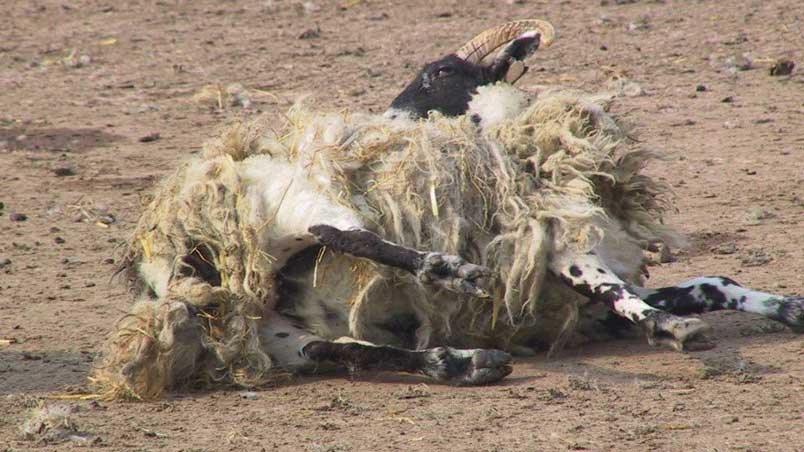Scab data show seriousness of problem for NI
 © NADIS
© NADIS Results of a Northern Irish sheep scab project have sparked concern after 75% of surveyed farms tested positive for the costly disease.
The alarming figure relates to 80 farms involved in the £220,000 Animal Health and Welfare Northern Ireland initiative co-ordinated by the Northern Ireland Sheep Scab group.
See also: Two lamb castration methods that put focus on animal welfare
Key points
- Farmer criticises department over lack of control on scab in markets
- Scab going “underreported” in Northern Ireland
- “Itchy sheep” changing hands in markets
However, vets have stressed that the proportion of farms suffering from the disease was expected to be high, because those taking part in the project anticipated finding an ectoparasite of some kind in their flock.
Sheep scab expert and project lead Stewart Burgess of the Moredun Institute said: “The level of responses to tests on blood samples from sheep in NI indicates that some flocks may have been infested with sheep scab mites for a prolonged period and that a high percentage of animals in these flocks are likely to have been infested.
“This unexpected level of ongoing infection to a wide extent in some flocks means that there is significant potential for local and onward spread of the disease.”
Scab facts
- Sheep scab was wiped out in Great Britain in 1951, but never eradicated from the island of Ireland
- It was reported again in the UK in 1971
- Control was deregulated in the UK in 1992
- 10-15% of flocks have scab, amounting to 8,000-10,000 outbreaks a year in the UK
- A reliable blood test is available for the disease
- For more information, visit the National Animal Disease Information Service
Department criticised
Farmers have been advised to seek veterinary advice as early as possible if they suspect scab in their flocks, to reduce having to deal with the disease in lambs as well as ewes.
Voicing frustration, one farmer said: “Live markets see a lot of itchy sheep sold through them and nobody seems to be bothering, including the Department of Agriculture, Environment and Rural Affairs (Daera).
“There is a lack of dipping courses available, hence the reason I opted for injectables and not dip. Although, if I was to do it again, I would dip and get a contractor in, but hopefully next year is better.”
A Daera spokesman said that disease prevention, detection and eradication was among Daera’s “primary objectives”.
The spokesman added: “Sheep scab is a notifiable disease in Northern Ireland and cases must be reported to Daera under The Sheep Scab Order (NI) 1970.
“Officials keep control of the disease under review in partnership with industry stakeholders, affected flock keepers, and through co-operation with our colleagues in Great Britain and the Republic of Ireland.”
Trading issues
National Sheep Association regional development officer Edward Adamson said some smaller businesses, which were common in Northern Ireland, were dependent on buying, feeding, improving, and selling sheep into a rising market as an income stream.
“Stock are moving about so much over here, it’s just the way it’s been traditionally,” said Mr Adamson.
“It’s difficult to point the finger at anybody. It’s a good scheme and ultimately, we hope to eradicate scab one day.”
Sheep scab surveillance project details
- A farm inspection and risk assessment is carried out by a vet, followed by a blood test and treatment if needed, all free of charge
- Costs are covered by the Biotechnology and Biological Sciences Research Council (BBSRC)
- Treatment can include plunge dipping in organophosphate – the preferred method – or injectables
- More than 80 farms have so far taken part, but there are 100 places in total
- For more information on joining the project, email Animal Health and Welfare NI at info@animalhealthni.com or martin@animalhealthni.com
Under-reported
Vet Paul Crawford, Northern Ireland Sheep Scab group chair, said despite being a notifiable disease in the province, a lot of sheep scab goes under the radar.
“We have been lagging behind the rest of the UK in both research and piloting control strategies for decades,” said Mr Crawford. “We hope this project will act as a catalyst for change.”
He said just nine cases of sheep scab were confirmed by Daera between 2016 and 2021, from 29 investigations.
This was one of the findings of his 2021 doctorate Sheep scab in Northern Ireland: its distribution, cost and farmer knowledge about prevention and control.
The paper, published in Preventative Veterinary Medicine, featured a survey that found the following from 122 respondents:
- 36% of sheep farms said they had suffered at least one scab outbreak in the previous five years
- 79% (94 farms) said there was a social cost and emotional stress to a scab outbreak
- 22% (27 farms) did not know that sheep scab was a notifiable disease in Northern Ireland.
